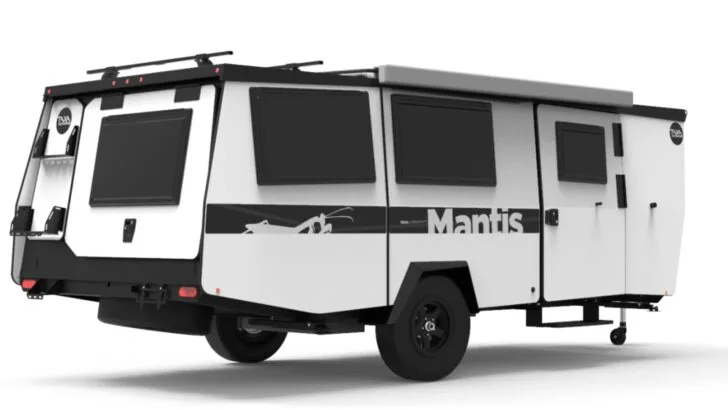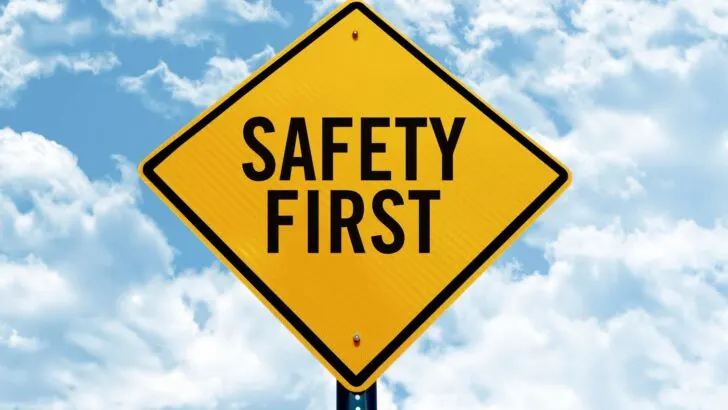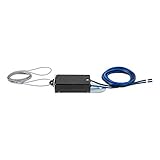If you’ve ever asked yourself “Do I need a breakaway cable on my trailer?” you’ve come to the right place. You may have seen our post on how to connect a trailer breakaway cable, but are braking systems for trailer breakaways required?
In this post, we address this question specifically as it pertains to the laws and regulations in North America as of this writing.
What Is a Trailer Breakaway Cable?
A trailer breakaway cable is a small safety cable that connects from your towing vehicle to the breakaway switch attached to the trailer, travel trailer, or 5th wheel. Cars towed behind motorhomes also utilize the same type of safety system.
If a trailer breaks loose from the towing vehicle, you will of course no longer have normal braking control of the trailer.
The purpose of the breakaway cable is to ensure that the trailer brakes are activated automatically if the trailer should become disconnected from the towing vehicle. The moment the distance between the towing vehicle and the trailer increases (due to a breakaway), the cable will pull the pin that activates the trailer’s brakes, bringing it to a stop.
It’s important to clarify that the breakaway cable differs from the heavy-duty safety chains (or cables) designed to hold the trailer to the towing vehicle in the event of a hitch failure. That’s a completely different safety device.
It’s important to properly connect the trailer breakaway cable to ensure the breakaway system works when it’s needed. Correctly installed, the cable can prevent accidents and potential injury by activating the trailer’s brakes should the trailer become disconnected. For more on that topic, we refer you again to our post on how to connect a trailer breakaway cable.
Here are a few different types of breakaway cables that can be installed on virtually any trailer:
- RELIABLE SAFETY. This trailer breakaway switch offers safer towing by connecting your vehicle to your trailer's breakaway battery and trailer brakes....
- STRONG CONNECTION. To ensure a dependable electrical connection for the wires, this trailer breakaway switch is equipped with silver contact points
- ✅GOOD PERFORMANCE: Comes with stain steel O ring, easy adapte to your old break away cable pin, heavy duty carabiner makes it easy to clip cable to...
- ✅HIGH QUALITY-- Trailer Emergency Breakaway Cable wrapped with UV-resistant PU material, make high-strength woven steel wire cable scratch-resistant...
- PROVIDES A SAFER AND MORE EFFECTIVE CONNECTION to your trailer, because it doesn’t rust, fray or become damaged while towing which keeps you...
- THE COILED CABLE STAYS SAFELY OFF THE GROUND while you’re towing, preventing wear and tear to the cable and providing years of lasting use
Is a Trailer Breakaway Cable Required by Law?
So, if you’ve wondered “Do I have to have a breakaway cable on my trailer?” the answer is that it depends on where you’re traveling. Most U.S. States and Canadian Provinces do require a breakaway cable, though this is generally based on weight.
For a trailer that’s required to be equipped with a breakaway cable system, it must automatically activate emergency brakes should the trailer become separated from the tow vehicle. In the U.S., there are both state and federal regulations that require breakaway kits on certain types of trailers.
For instance, federal law states that if you’re towing a trailer with a gross weight of 3,000 lbs or more, it must have a breakaway kit installed. So, while there are states whose regulations apply to trailers with higher weights than 3,000 lbs, you still need to be in compliance with federal law.

Even the compact TAXA Mantis weighs in at 3,115 lbs. Many other small travel trailers are below, but very close, to the 3,000 lb cut-off weight that U.S. federal law requires to have a breakaway system. (Photo: TAXA Outdoors)
That said, some states may have additional requirements or exceptions related to a trailer brake system, so you may want to also check the laws in your home state or wherever you intend to travel. But overall, you need a breakaway cable on any trailer over 3,000 lbs towed in the United States.
According to Canadian Motor Vehicle Safety Regulations, trailers with a gross weight of over 4,500 kg (9,921 lbs) that are equipped with electric brakes must have a breakaway system installed.
But here again, some provinces and territories may have additional requirements or exceptions, so you’ll want to check with your local transportation authority to make sure you’re following all appropriate laws and regulations in all Canadian provinces and territories.
While you of course want to ensure that you’re legal in any state/province you travel through, we suggest that the best way to think about these sorts of RVing questions is from a safety standpoint first and foremost.
In our opinion, regardless of the regulations where you travel, it’s a good idea to have a breakaway cable system on all trailers.

Even if your trailer is in compliance with state and federal laws and regulations without a breakaway kit, having a breakaway system on any trailer is important from a safety perspective.
A breakaway system is a critical safety feature of any trailer. While it may only be required by law for certain types or weights of trailers, it’s highly recommended for all trailers.
If you add a breakaway kit to your towing system, you’re not only increasing your safety and that of your property, you’re also increasing the safety of everyone traveling with and around you when you’re towing. This alone is reason enough to have a breakaway kit installed.
Installing a breakaway system isn’t difficult, but it’s important to follow proper guidelines and instructions to ensure it’s done properly. You’ll also want to maintain and regularly test your breakaway cable to ensure that it’ll work when you need it.
For more information regarding installation and some important notes on what to avoid when you install a breakaway system, please see our post, How to Connect a Trailer Breakaway Cable the Right Way.
And if you want to be sure your trailer is able to stop quickly and under control, be sure to read our article, The Best Trailer Brake Controllers: Safely Stop Your Trailer.
Free RVing Tips, Tricks, Reviews, Giveaways & More
Subscribe to our daily newsletter! We’ve been full-time RVers for 20 years (!) and share everything we’ve learned about RVing in our daily blog posts. Join our online community to receive a wealth of great RVing knowledge delivered right to your inbox.
Whether this is your first time on the road or you’re a seasoned full-timer, you’ll love the wide range of RVing topics we cover. Don’t miss a single article or any of our famous RV gear Giveaways — Subscribe today!





Randy Springer
Saturday 14th of October 2023
When I tow a tow car behind my motorhome, what type of braking system must (or should) the tow car be equipped with? Can the tow vehicle braking system be employed and what type of control should be used?
TheRVgeeks
Saturday 14th of October 2023
Hi Randy! We think this article is a good place to start: https://www.thervgeeks.com/towed-car-brake-systems/ Please check that out, and we'd be happy to answer any follow-up questions the best we can.
Larry Derouin
Sunday 10th of September 2023
Taking Drivers Ed in the late 60's in Ca. and Md.,we were taught "no matter the weight, if the trailer has electric brakes, it MUST HAVE a WORKING breakaway or Deadman switch". I know for a fact in Md, it's required to pass vehicle safety inspection upon transfer of ownership. (Passing safety Inspection is required to get tags & registration).
My understanding is that a trailer of 1500#GTWR and higher requires brakes, whether Electric or Hydraulic surge brakes. You would think if that's so, then a breakaway or Deadman would also be required at the same weight ratings as the operating brakes.